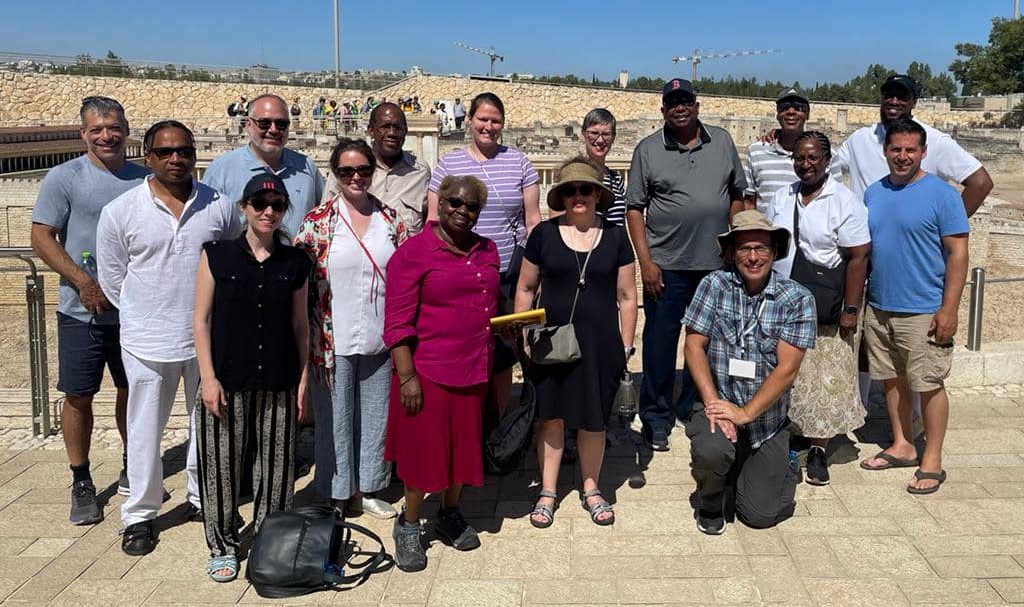By CEO Jeremy Burton
I arrived home yesterday after spending eleven days traveling with JCRC’s first study tour to Israel in over two years. Our delegation, a dozen local Christian ministers, was chaired by the Reverend Dr. Greg Groover, pastor of the Charles Street A.M.E. Church, and Rabbi Joel Sisenwine of Temple Beth Elohim. The group included Congregationalists, Lutherans, Unitarians, Methodists, Baptists, U.C.C., and non-denominational Christians.
Before we began our journey, I encouraged participants to listen in our various meetings for what point in time people began their stories. 1917 or 1948 or 1967? The arrival of Saladin or of Abraham? And so on. Because in this place that I care so much about, where you start your story says something about your identity and your analysis.
Along our journey, in addition to providing experiences uniquely meaningful to Christians, such as baptisms in the Jordan river, we met with people expressing diverse perspectives and narratives. Some of them challenged me deeply. For example, Hannah, who brought us to the neighborhood of Sheikh Jarrah to tell us about the work that she and others at Ir Amim are doing there. But even in her critique of her government, I hear values that resonate – such as her commitment to a two-state solution. She’s fighting, she tells us, as an Israeli, to protect and advance her understanding of Zionism; a term and a hope and a necessary Jewish homeland that resonates for her, despite the flaws she’s seeking to change.
Across the barriers that exist here, we hear a common thread. Whether it was a Palestinian guide in Bethlehem or a Jewish member of a farming community very near the Gaza border, we hear a critique of ‘solutions’ that, though they may solve the immediate symptom, do not address the underlying problem. Rather, they create more barriers, more obstacles. “It’s Tylenol”, this Jewish villager near Gaza tells us.
Demonization and simplistic answers may make people in the U.S. feel good, but they won’t actually help people on the ground. “We” need to build more mutual interests, not mutual animosity. “We have to learn”, said this villager who has to explain the red-alert of the rocket alarms to his three-year-old, “how to be good neighbors so that eventually these walls can come down, as all walls do.”
On our final day we toured the Peres Center for Peace and Innovation – an organization that we are committed to working with through our Boston Partners for Peace (BP4P) initiative. We met with Nadav Tamir, the former Consul General to New England and a dear friend of Boston’s Jewish community. When asked how Shimon Peres still managed to feel young when he was well past ninety, Nadav cites a famous quote from the former President:
Optimists and pessimists die the exact same death, but they live very different lives… You are as young as your dreams, not as old as your calendar.
As we concluded our time together in Tel Aviv on Wednesday night, I invited our participants to join me in staying connected with this place and its people when we return home – not by looking back to where the story begins, but by looking forward with optimism.
I invited us to remain inspired by groups and leaders that we met with along the way this week and whom we are committed to amplifying through BP4P. Visionaries like Mohammad Darwashe of Givat Haviva who is working every day to move Israel toward achieving the promise of its declaration of statehood, to ensure the full civic equality of all its citizens. People like Bassam Aramin and Rami Elhanan, two leaders of the Parents’ Circle who are holding each other’s grief and trauma over the loss of daughters to the violence and working together to build a shared future in a shared homeland.
Women like Hamutal Gouri, a leader in so many feminist spaces including Women Wage Peace, building a grassroots movement with their Palestinian partners at Women of the Sun to support and advance negotiations. And activists living on the West Bank, like Hanan and Noor from Roots/Shorashim/Judur, who are doing the challenging work of bringing Jews and Palestinians in their communities together for a movement of understanding and transformation.
We end our time together by looking to the future, holding on to and lifting up those who dream for this still-young country and its neighbors.
We all have a choice. There are those – here and in the U.S. – who want simple solutions to simplistic questions about who to blame and why this conflict endures. Their answers demonize; creating walls both physical and metaphorical without addressing the possibilities on the ground for a better future.
Or, we can choose to stand with those who want to build relationships and who see the possibilities for these two people. I choose the builders of these bridges, the weavers of peace, the ones who understand that holding each other’s humanity is itself a profound act of transformation. I choose hope.
I hope that you will join with me, JCRC, and Boston Partners for Peace, in making that same choice.
Shabbat Shalom,
Jeremy


